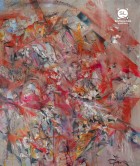“This Woman is the Only Woman” is so delightfully specific, unusual and playful; I can’t imagine anyone else writing it. How did it come into being?
Kids, I’ve found, are brilliant and hilarious. I steal from them a lot. Some of the stuff in this piece originated from things my kids have said, their fixations on perspective and time and quantities and body parts. They seem so much freer around these subjects than I can remember ever feeling, and being around that freedom can be inspiring. In a way, this piece was an attempt at capturing the power of conversations with people whose sense of the world and their roles in it have not stagnated or hardened. An ode to permeability.
Who is this woman, this daughter, this mother? What do you have in common with her?
The mother/daughter/woman is a version of myself, my kids, my mother, and other mothers I know. We’re each different humans, of course, but we are always on each other’s minds. Motherhood blew the doors off my sense of self. It brought an awareness that I’m not just this body, but also, at times, the bodies that brought me here and the bodies I helped form. I don’t get to be in charge, most of the time, of those other bodies, and there are also periods of my life, phases where I am not or will not be in charge of myself. Authority and responsibility flow in different pathways at different times of life. Making distinctions between us all can feel imprecise.
I feel a lot of what my children feel right now, because I am there to help them devise a framework for handling their emotions. They often mirror and model my feelings, my affectations, my coping mechanisms; they show me how I am incomplete and fallible and occasionally heroic. This can get burdensome and grotesque, but it can be empowering, too. Anything a parent says or does around the house might be witnessed, recontextualized, perpetuated. Three years ago my husband put a box on his head and the kids are still laughing about it. It’s hard to tell which moments a child will snatch and keep. And looking backward to my own childhood and relationship with my mom, the images and conversations I retain from that time are so peculiar and seemingly minor that it’s hard to instantly see their patterns, but they don’t feel random. Food, public vulnerability, any talk of genitalia. Those subjects mattered to me, and I see them and represent them differently than my mother did, but their intensity and import appears to be imprinting onto the next generation.
Are there any interesting passages, research, or ideas that went into the creation of this piece that didn’t make the final edit?
Fun question. The ending was difficult. I like to write humor. I wanted kind of a nouveau/chintzy God figure to peek out and turn out to be a mother, but it was a little too cute and too much of a tonal swerve for the last lines to accommodate. Mothers and gods have a lot in common—making people, laying down rules and systems, receiving infinite love as well as infinite blame. There’s so much hustling involved that it can be difficult to step back from it all and see that there is also glory, wonder, and so on.
This is such a delightful whirlwind of a read. Can you tell us about the process of writing it?
I tend to write for sound, particularly with shorter material. I read aloud all the time, my own work and everyone else’s. I trust my ear more than I trust my intellect about stories. I am a slow reader, and relative to other writers and academics, I am not terribly well read. The conveyance of an unusual sound or rhythm is what allows a piece of writing to slip past the guards, access my emotions, and sear into memory. Sound cuts through all my best efforts at stoicism, at resisting emotion and connection. Music seems to have its own defiant logic, and that must be a huge part of why it moves us and sticks in our brains. I try to make use of that in writing. My children’s irreverence has been busting in on my middle-aged sense of decorum for long enough now that it feels like a musical motif.
What do you think is flash fiction’s best-kept secret?
People often think of flash and its hybrid buddies as having less literary (and marketed) value than either longer fiction or poetry with line breaks. Genre-elusive work is harder to write a synopsis of and summarily discuss, but to me that means we’re onto something. Writing maps consciousness, and our collective consciousness is getting pretty fragmented and unruly. The writing of our time can’t exactly ignore those traits. Flash is nimble and mentally portable, like poetry, but unlike poetry, it feels unbound by theory and tradition. In the last decade that so many of us frittered away on social media, we have lost a lot, but we also worked out some cool, occasionally brilliant, albeit deeply imperfect forms of emotional shorthand. We can now quickly discern moods and motives from a stray bit of news from a stranger’s life. We get things wrong constantly, but we are so much better than we used to be at intuiting backstory from a scanned fragment of text. As writers we ought to—we get to!—play with the dimensions of this new literacy. If Tweets can be epic now, can truly bring down corporations/governments, imagine what a one thousand-word story can take on.



 The SmokeLong Grand Micro Contest (The Mikey) is now an annual competition celebrating and compensating the best micro fiction and nonfiction online.
The SmokeLong Grand Micro Contest (The Mikey) is now an annual competition celebrating and compensating the best micro fiction and nonfiction online.